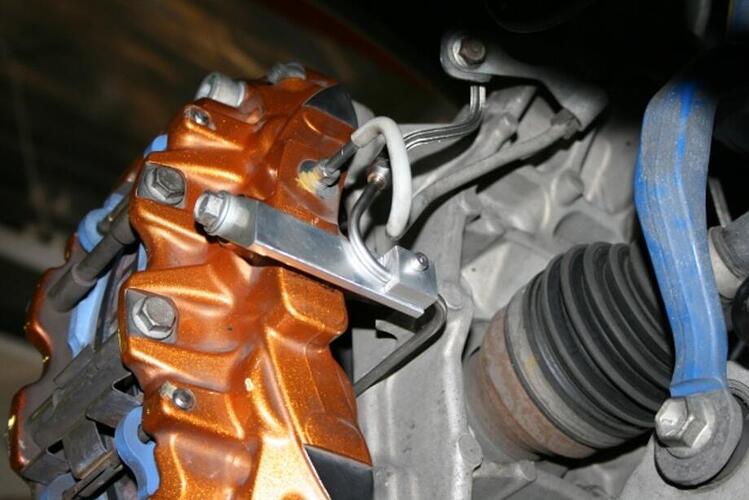As title says, so it’s a new set of discs. AP 308 ali belled cross drilled. What should I replace with? Recon I will replace rears too. Only use car for TDs and I use RS14 pads. Pads are only 20% worn, would you use them on the new discs? Discs are not scored. My thought are not to reuse but seems criminal to bin them when you consider what the cost. If I do replace pads too is there good/better alternative?
NOT interested in CL. Always been more than happy with the RS14’s.
Stick with rs14’s if you like them, no point ditching your AP bells so just get AP 308 grooved rotors, can’t go wrong.
I’m a bit pikey so I would keep the pads as they will soon bed in, but I’ll probably get shouted at ![]()
If your happy with your current pads with no problems carry on with them. Everybody has a different view point.
Replace discs with AP 308 grooved discs. Dont forget to use new bolts also.
Re the pads, the normal protocol would be to replace them but I have reused pads on many occasions, just giving them a good flat on a sheet of 80-120 rubbing paper on a flat surface
Shameless plug now
308 grooved discs http://www.seriouslylotus.com/index.php/ap-racing-308mm-brake-disc-rota-s.html
Dave, I was gonna call you tomorrow anyway[quote=Boothy]Stick with rs14’s if you like them, no point ditching your AP bells so just get AP 308 grooved rotors, can’t go wrong.
I’m a bit pikey so I would keep the pads as they will soon bed in, but I’ll probably get shouted at ![]() [/quote]
[/quote]
Thanks Bothster, pretty much what I was thinking too.
Pikeys rock !
Will be driving alot tomorrow so may not answer but will ring back if you leave me a message!!
Are the cracks more than just surface cracks?
Ironic that you pay more for the drilled…
[quote=stevegreen]
Ironic that you pay more for the drilled… [/quote]
More machining i suppose and less popular, AP make literally hundreds of discs with grooves but less with holes.
Cracks running out of holes…only 2/3mm long at the mo…not on all holes but it is something I have been expecting and it is only going to get worse. Car has done 11.5k now, from new May 08 all mainly track miles, and on my 4th set of pads, so don’t think they have done bad.
I understand what you are saying with the age/mileage; however, i’d still be a bit miffed if there was plenty of depth left in the discs and they cracked. Don’t OEM’s test before putting them on sale?
Never tried it but heard that counter sinking the holes may help in stress relieving the edges of the holes but not sure who would go to the effort of doing that on a set of discs.
How must the Porsche discs get on? They are literally covered in holes.
Porsche discs have the holes moulded in during the casting process, mega expensive. And still crack.
Countersinking the holes helps, but still crack.
There’s not a lot to be done to stoop this happening to be honest. Grooved discs still suffer the same fate, just takes longer. The cross drilling gives somewhere for the cracks to start from.
Get any piece of cast iron hot - as in 6-700 degree hot - and cool a few thousand times and it will crack. And thats before the additional stress of fast quenching when its wet, salt, vibration, etc
If they are only 1-2mm, I’d still use them…
[quote=DaveP]
If they are only 1-2mm, I’d still use them… [/quote]
Had such cracks on mine for a long time now, including before and after heavy track use. So as they don’t seem to be growing I’ll stick with them until the discs are dead.
Probably go grooved next time though ![]()
/ I’ll report back if the discs explode at Abbeville next month ![]()
Some small cracking is normal and bound to occur - as John says above, if you look at grooved discs you can see small cracks also.
With drilled discs, it’s only a problem if the cracks are growing close towards the edge of the discs, or the cracks are joining up between holes.
Agreed, and in any event Discs are a wearing item , not just pads, of whatever make ![]()
OK…new discs when pad need replacing…new discs and new pads…won’t be long.
RIP
http://exiges.com
said
Don’t worry
[quote=JDS]Get any piece of cast iron hot - as in 6-700 degree hot - and cool a few thousand times and it will crack.
[/quote]
I know that’s a common experience with discs on cars but the science behind why it cracks suggests that this does not have to be the case.
Quoting source document
“If the stress developed does not exceed the fatigue limit of the metal in the surface layers of the mould, cracking would never be expected to occur.”
Of course cost may then be an issue to make such a disc but it seems making alloys to work at different temps is being done.
Also interesting to read the results of annealing the material in terms of resistance to cracking and wonder if this would be applicable to brake discs?
From discussing this with AP, the biggest problem they face is uneven heating. The temperature of the disc friction surface rises very quickly to 600-700 degrees, while inner surface has an amount of cooling air presented to it. It appears to be this that causes the problem over repeated cycles, rather than the temperature itself.
Would that suggest you could go back to solid discs and maybe cool the friction surfaces either by directing air via ducts or even having water cooled ones?
Interesting to see this water cooled brake system actually stating that water injection into the rotor vane actually helps “prolonged rotor life with fewer cracks developing”.
Some more info HERE
